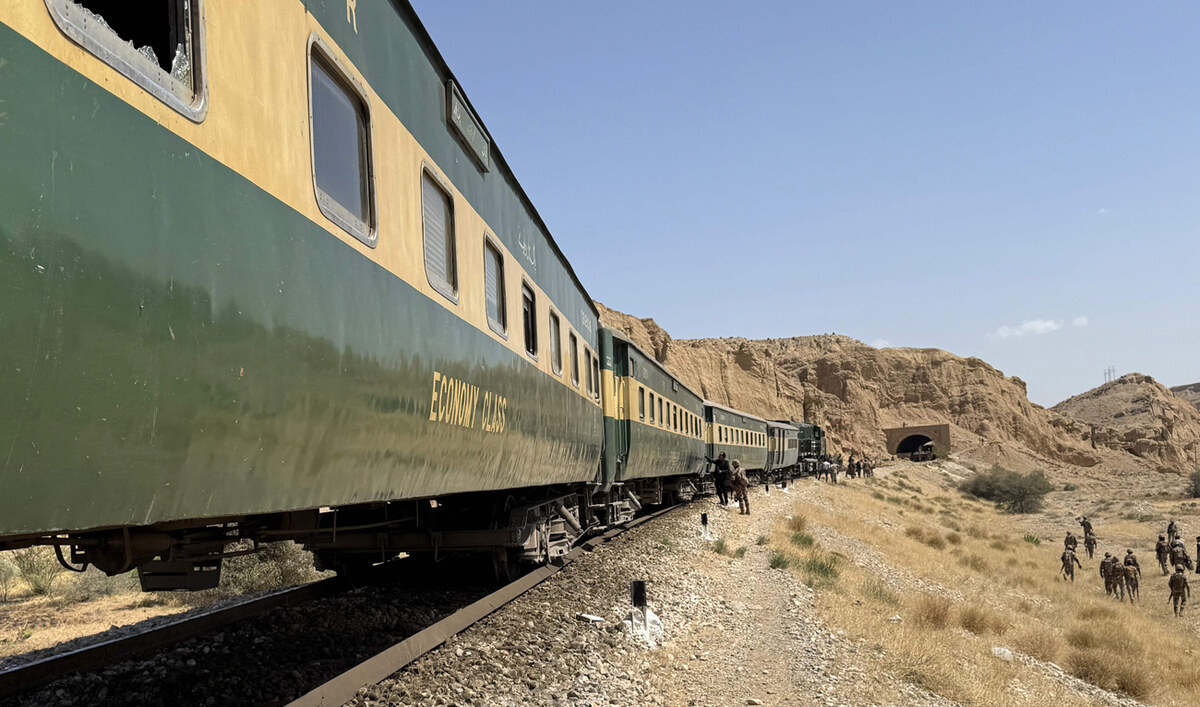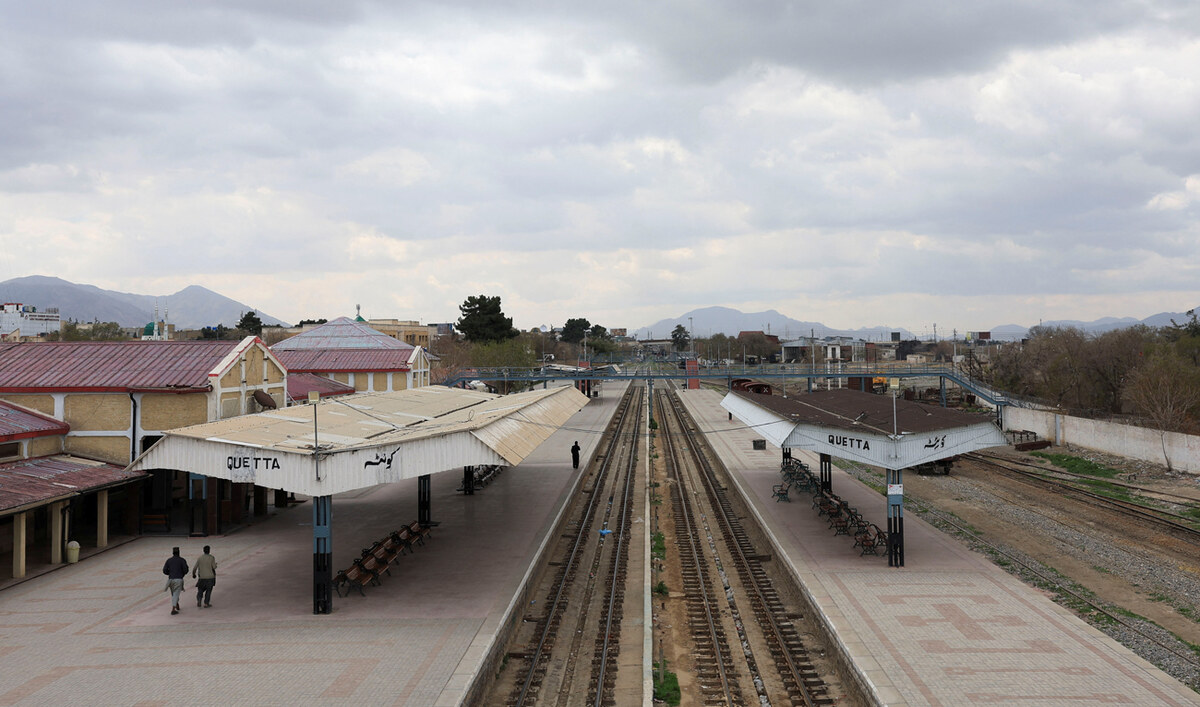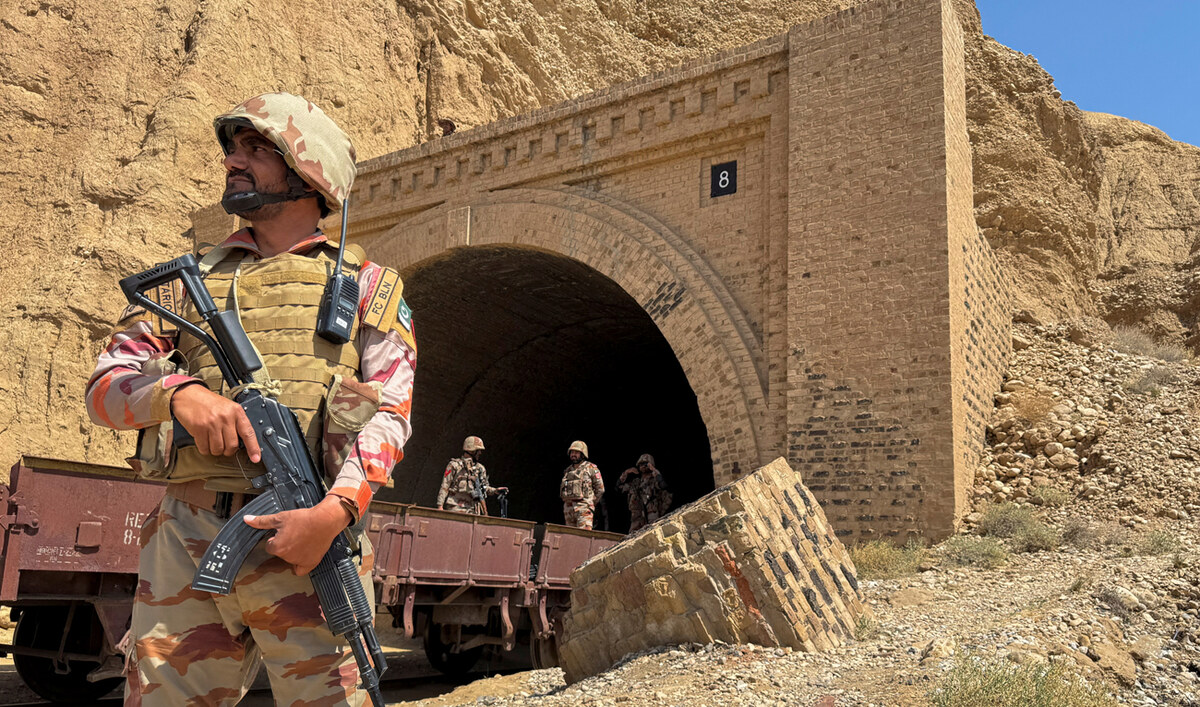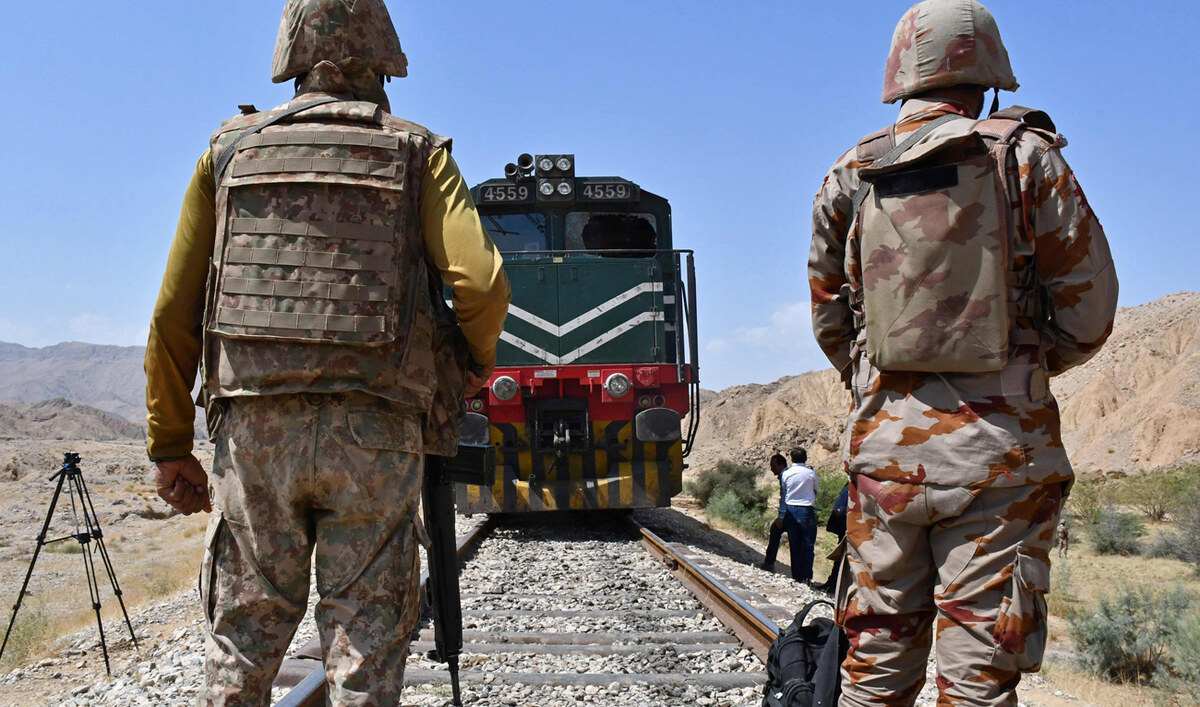ISLAMABAD: Pakistan Prime Minister Shehbaz Sharif on Sunday attended a panel discussion as part of his World Economic Forum engagements in Riyadh, where he highlighted “global inequity” as a major problem in addressing health care needs around the world.
Sharif made the remarks while speaking at a panel discussion, titled “Redefining Global Health Agenda,” during a special two-day meeting of the World Economic Forum (WEF) in the Saudi capital.
The prime minister spoke about a number of health care issues and recounted to the attendees how the COVID-19 pandemic had exposed health care “imbalances” across the world.
“Today, I think the first and foremost problem is global inequity,” he said. “Now look at COVID, it exposed these imbalances, gaps hugely. Imagine, global north and global south distribution of vaccines and so on and so forth.”
The prime minister highlighted climate change as another major factor affecting health care in the world, explaining the devastation caused in Pakistan by climate-induced floods in 2022.
“Pakistan does not contribute even a fraction of emissions yet we are on the red list of climate change and in 2022, we experienced the worst climate change floods in Pakistan, devastating everything from hostels, schools, lands, agriculture, everything,” he noted.
“And we had to invest hundreds of billions of rupees to rehabilitate people, but when it came to the question of seeking funds from abroad, those were loans, expensive loans.”
Sharif questioned how could a developing country afford such expensive loans to rehabilitate people who were affected by a crisis they did not contribute to.
The Pakistan prime minister arrived in Riyadh on Saturday to attend the WEF meeting on global collaboration, growth and energy. He was extended an invitation to attend the meeting by Crown Prince Mohammed bin Salman and Professor Klaus Schwab, the WEF executive chairman.
“PM Shehbaz Sharif and his delegation will present Pakistan’s priorities in global health, fintech, climate change, inclusive energy and rejuvenating growth,” the Prime Minister’s Office (PMO) said in a statement on X.
The PMO said Sharif will also meet Kuwait’s emir, Meshal Al Ahmed Al Jabr, and Saudi ministers of finance, industry and investment separately.
“The Prime Minister will also meet the Co-Chairman of the Bill & Melinda Gates Foundation, the Managing Director of the International Monetary Fund and the President of the Islamic Development Bank,” the PMO said.
Prior to Sharif’s departure, the PM Office said he would be accompanied by Foreign Minister Ishaq Dar and Finance Minister Muhammad Aurangzeb.
It said Sharif’s participation in the forum will afford Pakistan an opportunity to highlight its priorities in global health architecture, inclusive growth, revitalizing regional collaboration, and the need for striking a balance between promoting growth and energy consumption.
SHARIF, ISLAMIC DEVELOPMENT BANK PRESIDENT DISCUSS ONGOING PROJECTS
Sharif met Dr. Muhammad Sulaiman Al Jasser, the president of the Islamic Development Bank (IDB) during the sidelines of the WEF meeting to discuss the bank’s ongoing projects in the country.
The two sides reviewed the current progress of IDB’s projects in Pakistan. Sharif thanked the IDB president for the bank’s investment of $1 billion in Pakistan during his tenure, the PMO said.
The Pakistani prime minister thanked the ADB president for the bank’s financial support during the devastating 2022 floods in Pakistan.
“Both sides agreed to complete the IDB’s ongoing projects in Pakistan as soon as possible,” the PMO said. “Both exchanged views on finding new ways to enhance cooperation between Pakistan and the IDB.”
Sharif will also attend the 15th session of the Islamic Summit Conference organized by the Organization of Islamic Cooperation (OIC) on May 4-5 in the Gambian capital of Banjul to discuss a variety of regional and global issues, including Palestine, Islamophobia, climate change and the status of minorities, the Pakistani state-run APP news agency reported.
The session will be held under the slogan “Enhancing Unity and Solidarity through Dialogue for Sustainable Development,” according to a press release issued by the OIC General Secretariat.
The Islamic Summit is a principal organ of the OIC focused on the formulation, development, and implementation of decisions made by 57 member states. It is attended by concerned heads of state such as prime ministers, presidents, emirs and other equivalent heads.
At WEF session in Riyadh, Pakistan PM highlights ‘global inequity’ in health care
https://arab.news/5vpqk
At WEF session in Riyadh, Pakistan PM highlights ‘global inequity’ in health care

- Shehbaz Sharif cites the example of COVID-19 pandemic, distribution of vaccines in global north and south
- The Pakistan PM is in Riyadh to attend a two-day World Economic Forum meeting on global growth and energy
Pakistan Railways awaits security clearance to repair track damaged in deadly Balochistan attack

- BLA separatists targeted a passenger train earlier this week, taking more than 200 hostages
- The militants killed 31 people in the attack, derailing the train and damaging 398 feet of track
QUETTA: A delegation of Pakistan Railways officials visited the site of a militant attack on a passenger train in the southwestern mountainous Bolan region on Saturday, saying repair work on the damaged track would begin after security clearance to restore train service from Balochistan.
Dozens of separatist Balochistan Liberation Army (BLA) militants attacked the Quetta-Peshawar-bound Jaffar Express with bomb, gun and rocket attacks on Tuesday afternoon, killing 31 people and taking more than 200 passengers captive.
The hostage crisis lasted for 36 hours before security forces executed a rescue operation, killing 33 militants and securing the release of the passengers.
Speaking to the media, Rasheed Imtiaz Siddiqui, deputy chief engineer of Pakistan Railways, said four carriages of the Jaffar Express had derailed in the attack and 398 feet of track was damaged.

“Our teams are ready at Sibi, Mushkaf, Paneer and Aab-e-Gum railway stations,” he told reporters at the Bolan site where the train was hijacked.
“This is a highly sensitive area, and our teams will have to work from dawn to dusk since there can be security issues in the dark requiring formal clearance [from Pakistani forces],” he added.

Siddiqui said it would take at least eight to nine hours to clear the derailed carriages and repair the track.
Armed separatist groups often target trains and passenger coaches in southwestern Balochistan province, which has witnessed a low-level insurgency for decades against the Pakistani state.

The separatists accuse the government of stripping the province’s natural resources and leaving its people mired in poverty. However, government officials deny the allegation, saying they are working to uplift the province through development projects, including multibillion-dollar schemes funded by Beijing.
Last August, the BLA destroyed a historic bridge built by the British Army in the 18th century in the hilly area of Kolpur, suspending train service for nearly a month.

Pakistan's Frontier Corps stand guard at the siege site after armed militants ambushed a train in the remote mountainous area, at Pehro Kunri in Balochistan province on March 15, 2025. (AFP)
Brig. Umar Altaf, Commandant Sibi Scouts, told the media that the area was clear.
“The terrorists were confident they could prolong the standoff and propagate that the area was under their control,” he said, pointing out that they could not withstand the rescue operation.
“We have recovered eight magnetic improvised explosive devices from the area,” he continued. “They [the militants] were ready to blast the train, but we neutralized them.”
Blast in Pakistan’s northwest kills founder of banned militant outfit

- Mufti Munir Shakir of Lashkar-e-Islam was targeted in Peshawar while he was entering a mosque
- He was rushed to Lady Reading Hospital in critical condition where he succumbed to his injuries
PESHAWAR: A blast on the outskirts of the northwestern Pakistani city of Peshawar on Saturday killed local cleric Mufti Munir Shakir, founder of the banned militant outfit Lashkar-e-Islam, a hospital official confirmed after Shakir was rushed there in an injured state following the explosion.
Established in 2004, Lashkar-e-Islam initially focused on enforcing a strict interpretation of Islam before establishing a parallel governance system in parts of the Khyber district between 2008 and 2014.
Its members frequently clashed with Pakistani security forces, contributing to the broader insurgency in the tribal region, which was later merged with Khyber Pakhtunkhwa province.
“Mufti Munir Shakir ... was brought into the [Lady Reading] hospital in a critical condition with three other wounded people in the blast,” Muhammad Asim, the spokesperson of the medical facility, said in a statement. “Unfortunately, Mufti Munir Shakir embraced martyrdom at the hospital. Right now, we are in the process of handing over his dead body to his relatives.”
Speaking to Arab News, Noor Muhammad, the Station House Officer of the area where the attack occurred, said the blast took place outside a mosque and specifically targeted Shakir.
“The moment Mufti Munir Shakir was entering the mosque at around 5 PM the blast took place, leaving four persons wounded,” he said. “It was a planted bomb.”
No group has so far claimed responsibility for the attack.
Khyber Pakhtunkhwa has experienced a surge in militant violence, with frequent attacks targeting security forces and civilians.
The region has mostly been targeted by the proscribed Tehreek-e-Taliban Pakistan (TTP), whose leadership is reportedly based in neighboring Afghanistan.
Pakistan has frequently accused the interim Afghan Taliban administration of sheltering these militants and facilitating their cross-border attacks in its border region, an allegation denied by Kabul.
Last month, a prominent religious cleric, Maulana Hamid-ul-Haq, lost his life in a massive suicide bombing at the Darul Uloom Haqqania seminary in Akora Khattak that killed at least six other individuals.
The seminary has earned a reputation for producing several Afghan Taliban leaders, prompting the administration in Kabul to condemn the attack and blame it on the rival Daesh group in the region.
Prior to the explosion that killed Mufti Shakir on Saturday, police officials confirmed that militants launched four coordinated overnight attacks in the province, targeting police stations in two districts, leaving one attacker dead and a police officer injured.
The first three attacks took place in Bannu, a restive district located on the periphery of North Waziristan bordering Afghanistan.
The fourth attack occurred in the adjacent Lakki Marwat district when a group of well-armed militants launched an assault on the Abbasia police station, sparking a fierce gunbattle.
The confrontation resulted in the death of one militant, while others managed to flee the scene.
“During the chase, a police vehicle hit a roadside improvised explosive device, injuring one police official who was transported to a nearby medical facility for treatment,” Shahid Marwat, the spokesperson of the district’s police, told Arab News.
In a statement released earlier in the day, Khyber Pakhtunkhwa’s Police Chief Zulfiqar Hameed also paid tribute to the courage of the police personnel for thwarting successive militant attacks in the two districts.
Pakistan Navy launches second Hangor-class submarine in China to boost maritime defense

- Equipped with advanced weapons and sensors, the submarine will strengthen Pakistan’s deterrence capabilities
- The deal with the Chinese company will get Pakistan six more submarines with technology transfer agreement
ISLAMABAD: The Pakistan Navy launched its second Hangor-class submarine, PNS/M Shushuk, at a ceremony in Wuhan, China, as part of a strategic initiative to bolster its maritime defense capabilities, according to an official statement on Saturday.
The country’s defense ministry signed an agreement with China Shipbuilding and Offshore International Company during Chinese President Xi Jinping’s visit to Pakistan in 2015 to acquire eight of these submarines. Under the deal, four submarines are being built in China, while the remaining four will be constructed at Karachi Shipyard and Engineering Works under a transfer of technology program.
Equipped with state-of-the-art weapons and sensors, these submarines are expected to enhance Pakistan’s naval capabilities by enabling precision strikes at standoff ranges.
Pakistan’s Vice Chief of the Naval Staff, Ovais Ahmed Bilgrami, attended the ceremony as the chief guest.
“While addressing the ceremony, the Vice Chief of the Naval Staff highlighted the importance of maritime security in the prevailing geo-strategic environment of the region, as well as Pakistan Navy’s commitment to safeguarding national interests and ensuring a safe and conducive maritime environment for all,” the official statement circulated by the Directorate General of Public Relations of Pakistan Navy said.
“He emphasized that Hangor-class submarines, equipped with state-of-the-art weapons and sensors, will play a pivotal role in maintaining the balance of power and maritime order in the region,” it added.
Pakistan’s deal with the Chinese company is expected to enhance its naval defense in the Indian Ocean region by equipping its fleet with stealth-capable submarines designed for low acoustic signatures, making them harder to detect.
These advanced vessels also aim to strengthen the country’s deterrence capabilities while reinforcing Pakistan-China military ties through strategic defense collaboration.
Beyond the Hangor-class project, Pakistan is enhancing its naval capabilities through collaborations with other nations.
In 2018, the country signed a contract with Turkiye for the construction of four MILGEM-class corvettes.
Additionally, a Turkish company was also engaged to upgrade Pakistan’s Agosta 90B-class submarines.
Security forces kill nine militants, lose two soldiers in Pakistan’s northwest

- Pakistani forces carried out two separate intelligence-based operation in Mohmand and Dera Ismail Khan
- An official statement says the armed forces recovered weapons, ammunition from the deceased militants
KARACHI: Pakistani security forces killed nine militants in two intelligence-based operations in northwestern Khyber Pakhtunkhwa province, the military’s media wing, Inter-Services Public Relations (ISPR), said in a statement on Saturday, adding two soldiers also lost their lives in one of the encounters.
Khyber Pakhtunkhwa has seen a surge in violence by banned Tehreek-e-Taliban Pakistan (TTP) militants in recent months, with deadly suicide bombings, attacks on security checkpoints and targeted of civilians and security personnel.
Pakistani security forces have conducted several intelligence-based operations in the region, with the latest ones carried out in Mohmand District and Dera Ismail Khan between March 14 and 15.
Pakistan refers to TTP militants as “khwarij,” a historical term describing an extremist sect in early Islam known for rebelling against authority and declaring other Muslims apostates.
“On reported presence of Khwarij, an intelligence based operation was conducted by the Security Forces in Mohmand District,” the ISPR said. “During the conduct of operation, own troops effectively engaged the khwarijs’ location, resultantly, seven khwarij were sent to hell.”
“However, during intense fire exchange, two brave sons of soil, Havildar Muhammad Zahid (age: 37 years, resident of District Malakand) and Sepoy Aftab Ali Shah (age: 26 years, resident of District Chitral) having fought gallantly, rendered the ultimate sacrifice and embraced shahadat [martyrdom],” it added.
The second operation was carried out in Maddi, Dera Ismail Khan District, where security forces engaged militants in a gunfight.
“A fire exchange took place between own troops and khwarij,” the statement continued. “Resultantly, two khwarij were effectively neutralized.”
The ISPR said security forces also recovered weapons and ammunition from the militants, who, according to the military, were actively involved in multiple violent activities.
The statement informed that “sanitization operations” were ongoing in both districts to eliminate any remaining militants.
Pakistan set to face New Zealand in T20I series opener in Christchurch on Sunday

- Skipper Salman Ali Agha says the team will try to produce better results in New Zealand
- A three-match ODI series, set to follow the T20I action, will run from March 29 to April 5
KARACHI: Pakistan are all set to take on New Zealand in a five-match T20I series starting Sunday, the country's cricket board said in a statement, with the first game to be played at Hagley Oval in Christchurch.
The Pakistan squad arrived in New Zealand on Thursday and held their first training session on Friday afternoon. Before their arrival, the T20I squad underwent a pre-series camp from March 7 to 10 in Lahore.
Pakistan’s squad includes three uncapped players — Abdul Samad, Hasan Nawaz and Mohammad Ali — who earned call-ups to the national side following their impressive performances in recent domestic events.
Skipper Salman Ali Agha, who led the team to a 2-1 T20I series win in Zimbabwe in his first series as captain, expressed satisfaction with the players' performance ahead of the series.
“The team's preparations are going well, and we will try to produce better results in New Zealand," the Pakistan Cricket Board (PCB) quoted him as saying in a statement. "We have some young players in the side, and it is an opportunity for them to showcase their talent at the international level after performing well in domestic cricket.”
Pakistan have an upper hand over New Zealand in the 44 T20I contests between the two sides, with 23 wins, while the Black Caps have secured victory in 19 fixtures.
The last T20I series featuring the two sides, played in Pakistan in 2024, ended in a 2-2 draw, with one match abandoned due to rain.
More recently, though, Pakistan's cricket squad has come under significant criticism for their performance following their early exit from the 2025 Champions Trophy after losses to New Zealand and India.
During their tour to New Zealand, Pakistan will play their second match at University Oval in Dunedin on March 18, while the third match of the series will be played at Eden Park in Auckland on March 21.
The fourth and fifth T20Is will be played at Bay Oval in Mount Maunganui and Sky Stadium in Wellington on March 23 and 26, respectively.
A three-match ODI series will follow the T20I action and will be played from March 29 to April 5.












